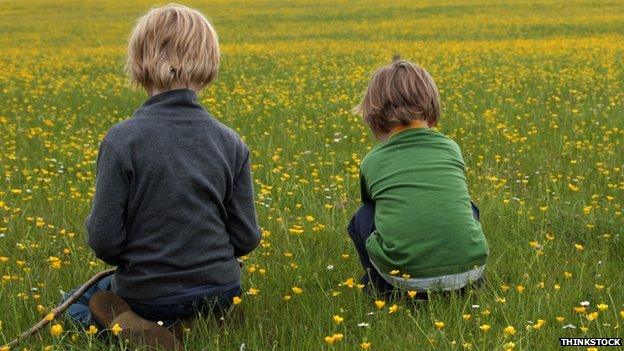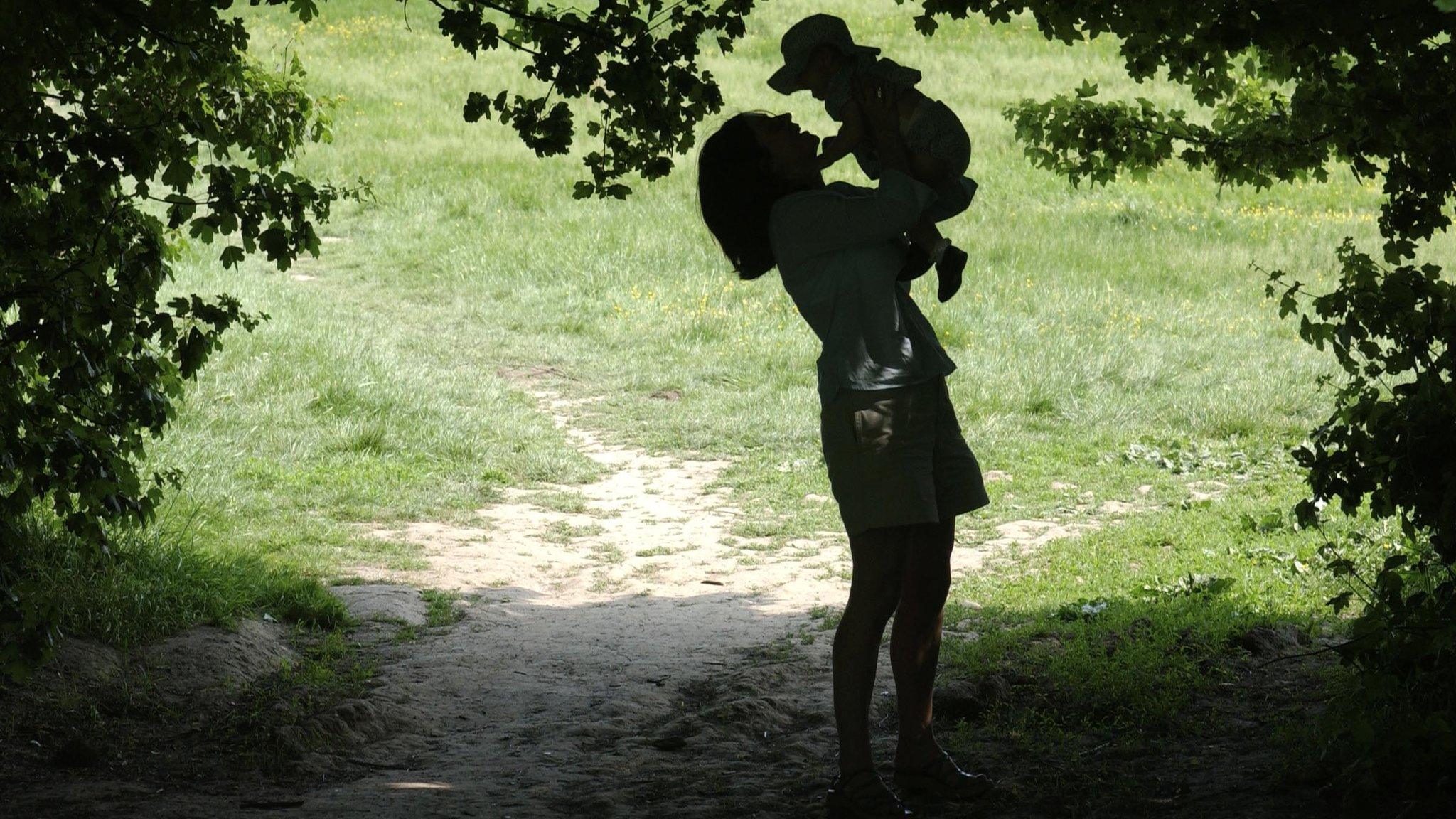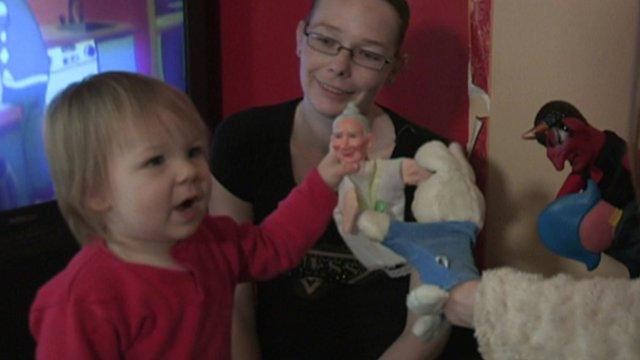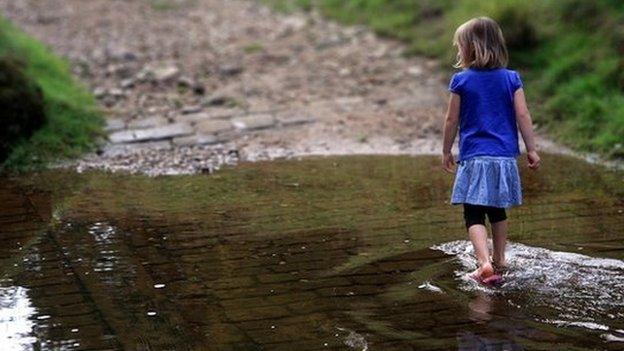Adoption services 'should be merged'
- Published
- comments

Some children spend months in care waiting to be found a family, say ministers
Councils in England could be forced to merge their services to speed up adoption rates, under measures included in next week's Queen's Speech.
Children can spend months in care waiting for adoptive parents to be found, according to ministers.
Councils should join forces to match children and families far quicker, said children's minister Edward Timpson.
The Local Government Association (LGA) said councils were already working together on adoption.
Ministers believe adoption is happening at too localised a level, which limits the number of families available to adopt and leads to delays.
Official figures suggest more than 3,000 children already put forward by local authorities for adoption are waiting to be matched with parents.
More than half of these have spent 18 months in care, says the government.
Children's minister Edward Timpson: "Every month that goes by is a month that they lose of their childhood"
It says merging adoption services would open up a greater number of potential adopters for every child.
New powers in a Schools and Adoption Bill will allow the government to require councils to combine their adoption functions if they fail to join together within the next two years.
A Department for Education spokeswoman said there was no prescriptive top-down plan for how the merged services would work.
The department wants councils to come up with their own approach, perhaps uniting under one system for a region or city, or outsourcing to an agency.
"Every single day a child spends waiting in care for their new family is a further delay to a life full of love and stability. This just isn't good enough," said Mr Timpson.
"By coming together and joining forces, councils can make sure more children are matched with families far quicker, regardless of where they live."
'Child's best interests'
David Simmonds, chairman of the LGA's children and young people board, said: "Finding loving homes for children is one of the most important jobs councils do and we are already working together to do this.
"Regional work on adoption, external is already taking place and many homes for children have been provided in this way.
"The welfare of a child is at the heart of every decision on adoption a council makes and we would like to see councils encouraged to work regionally only if this is in the best interests of a child."
Barnardo's chief executive Javed Khan said: "The immediate and long-term welfare of the child must always be paramount.
"Getting children into the best placement first time reduces disruption and should be an essential part of the system. There are still many children waiting too long for a loving home, so we welcome any efforts that put children first."

Adoption - your stories
People who have been through, or are going through, the adoption process told the BBC about their experiences.
Claire, from Dorset, was approved to adopt as a single parent in August 2014.
She said: "I was linked with a child in September 2014. This child is still not with me due to delays caused by a birth parent contesting.
"My matching panel is now 26 June and hopefully he will be home with me by the end of July.
"I feel so sorry for this little man kept waiting."
Paul, from Berkshire, said he and his wife had been involved in the "slow" process for just over two years.
"We had to go through a lot of meetings - and then meetings were missed, and meetings cancelled, and our files were forgotten, so the process was quite weird and disjointed," he said.
James, who adopted a little girl two years ago, told the programme: "The entire adoption process took around three years but I do understand that that has been streamlined considerably now."
Caroline, who along with her partner has recently been approved to adopt, said they had been told they could search for a child on the national register.
She welcomed the opportunity to look in different areas, and said of the process: "I'm not sure it's as joined up as it could be, but I think they do the best they can with the resources they have."
A man from Fife in Scotland, who asked not to be named, said he had been going through the adoption process with his partner since March 2014 and would welcome a national register.
He added: "Every appointment has been missed, delayed or rescheduled.
"As potential adopters it's frustrating for us but for the children waiting it must be far worse.
"Adoption in our area is done locally, which is worrying."

Alison O'Sullivan, president of the Association of Directors of Children's Services, welcomed the move.
Speaking to BBC Radio 4's Today programme, she said: "We've been working with government, with voluntary adoption agencies, with the courts over the past several years now to try and improve the process and improve the ability to find families for children as quickly as possible.
"There's been a lot of progress made but there is much more to do. And we think that combining efforts across local authorities is a welcome development."
'Harmful delay'
The British Association for Adoption and Fostering welcomed the plan, saying it was not acceptable for children to wait up to 18 months for an adoptive family.
"Delay is itself significantly harmful and every step must be taken to minimise it," said the association's policy director, John Simmonds.
"Working together across all organisations to deliver this objective could not be more important and there are many excellent examples where this currently happens."
The change is designed to speed up the system for children who are waiting to be matched with adoptive families after court judgements have ruled in favour of them being adopted.
The number of children being put forward for adoption by councils in England fell sharply last year after the most senior family court judge criticised the "sloppy practice" of some social workers when bringing these cases.
Sir James Munby, president of the Family Division, said they were not always looking closely enough at all the other options.
However, government efforts to promote adoption have seen an overall increase in the number of adoptions across the UK, from 3,100 in 2011 to 5,050 last year.
- Published22 May 2015

- Published13 May 2015

- Published2 February 2015

- Published11 November 2014
